Regulierung internationaler Finanzmärkte und Banken
Die Forschungsgruppe "Regulierung internationaler Finanzmärkte und Banken" analysiert internationale Kapitalströme und die Auswirkungen von Regulierungsänderungen auf die Finanzstabilität. Integrierte Finanzmärkte begünstigen eine effiziente Kapitalallokation und Risikoteilung – sie erleichtern aber auch die grenzüberschreitende Übertragung von Schocks.
Dementsprechend hat sich die Bankenregulierung in den letzten Jahren weiterentwickelt, wobei die vollen Auswirkungen dieser Reformen noch unklar sind. Daher konzentriert sich die Forschung der Gruppe auf zwei Bereiche:
Erstens werden die Haupttreiber internationaler Kapitalströme und deren Auswirkungen auf Finanzstabilität untersucht. Zeiten hoher Finanzintegration sind oft gefolgt von Krisen mit nachhaltigen realwirtschaftlichen Folgen. Ziel ist es, zu verstehen, wie eine stabile und effektive Kreditvergabe gewährleistet werden kann.
Zweitens wird untersucht, wie sich Veränderungen in der Regulierung und Aufsicht auf das grenzüberschreitende Bankgeschäft auswirken, insbesondere im Kontext der europäischen Integration. Dazu gehört die Bewertung des Trade-offs zwischen regulatorischer Harmonisierung und unbeabsichtigten Marktverzerrungen.
Zwei Datenprojekte tragen zu diesen Forschungsthemen bei: die International Banking Library, eine webbasierte Plattform für den Forschungsaustausch mit einem vierteljährlichen Newsletter, der mehr als 700 Abonnenten erreicht, und die Financial Markets Directives Database, die die Umsetzung der wichtigsten EU-Vorschriften im Bereich Finanzmärkte mit besonderem Schwerpunkt auf der Europäischen Bankenunion dokumentiert. Gemeinsam fördern sie eine evidenzbasierte Politikanalyse und erhöhen die Sichtbarkeit der Gruppe.
Forschungscluster
Wirtschaftliche Dynamik und StabilitätIhr Kontakt

- Abteilung Finanzmärkte
PROJEKTE
10.2021 ‐ 06.2025
Distributional Effects of Macroeconomic Policies in Europe (DEMAP)
Leibniz-Gemeinschaft
Das Projekt untersucht wie politische Maßnahmen auf dem Level der Europäischen Union, wie zum Beispiel der European Recovery Fund, die Ungleichheit zwischen Haushalten beeinflusst.
07.2017 ‐ 12.2022
Die politische Ökonomie der europäischen Bankenunion
Europäischer Sozialfonds (ESF)
Ursachen für nationale Unterschiede in der Umsetzung der Bankenunion und daraus resultierende Auswirkungen auf die Finanzstabilität.
01.2015 ‐ 12.2017
Dynamic Interactions between Banks and the Real Economy
Deutsche Forschungsgemeinschaft (DFG)
Referierte Publikationen

Should I Stay or Should I Go? Bank Productivity and Internationalization Decisions
in: Journal of Banking and Finance, Nr. 42, 2014
Abstract
Differences in firm-level productivity explain international activities of non-financial firms quite well. We test whether differences in bank productivity determine international activities of banks. Based on a dataset that allows tracking banks across countries and across different modes of foreign entry, we model the ordered probability of maintaining a commercial presence abroad and the volume of banks’ international assets empirically. Our research has three main findings. First, more productive banks are more likely to enter foreign markets in increasingly complex modes. Second, more productive banks also hold larger volumes of foreign assets. Third, higher risk aversion renders entry less likely, but it increases the volume of foreign activities conditional upon entry.
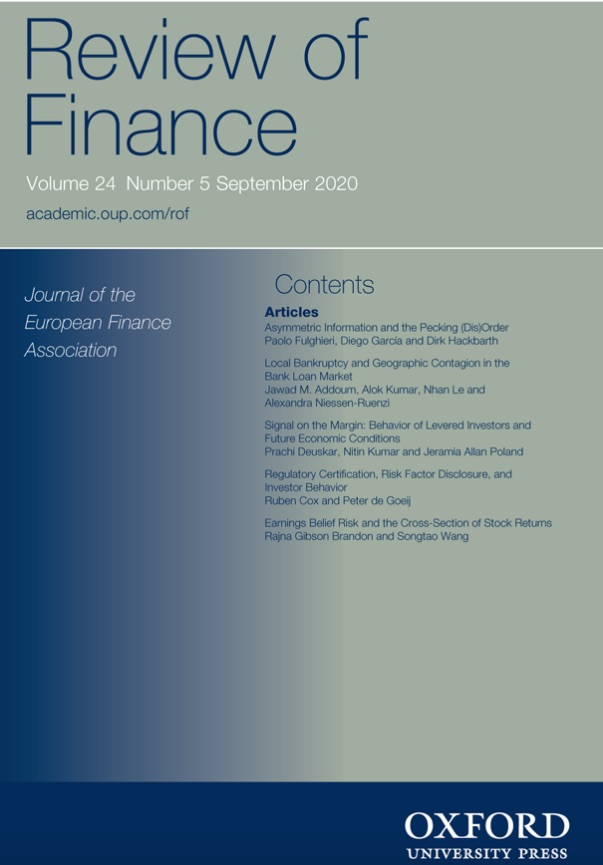
The Impact of Public Guarantees on Bank Risk-taking: Evidence from a Natural Experiment
in: Review of Finance, Nr. 2, 2014
Abstract
In 2001, government guarantees for savings banks in Germany were removed following a lawsuit. We use this natural experiment to examine the effect of government guarantees on bank risk-taking. The results suggest that banks whose government guarantee was removed reduced credit risk by cutting off the riskiest borrowers from credit. Using a difference-in-differences approach we show that none of these effects are present in a control group of German banks to whom the guarantee was not applicable. Furthermore, savings banks adjusted their liabilities away from risk-sensitive debt instruments after the removal of the guarantee, while we do not observe this for the control group. We also document that yield spreads of savings banks’ bonds increased significantly right after the announcement of the decision to remove guarantees, while the yield spread of a sample of bonds issued by the control group remained unchanged. The evidence implies that public guarantees may be associated with substantial moral hazard effects.

Do Banks Benefit from Internationalization? Revisiting the Market Power–Risk Nexus
in: Review of Finance, Nr. 4, 2013
Abstract
We analyze the impact of bank internationalization on domestic market power (Lerner index) and risk for German banks. Risk is measured by the official declaration of regulatory authorities that a bank is distressed. We distinguish the volume of foreign assets, the number of foreign countries, and different modes of foreign entry. Our analysis has three main results. First, higher market power is associated with lower risk. Second, holding assets in many countries reduce market power at home, but banks with a higher share of foreign assets exhibit higher market power. Third, bank internationalization is only weakly related to bank risk.
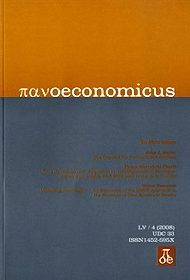
Initial Evidence from a New Database on Capital Market Restrictions
in: Panoeconomicus, Nr. 3, 2012
Abstract
One of the key obstacles to the empirical analysis of capital controls has been the unavailability of a detailed set of indicators for controls that cover a broad set of countries over a range of years. In this paper, we propose a new set of indicators derived from the Annual Reports on Exchange Arrangements and Export Restrictions. Contrary to most earlier attempts to construct control indicators from this source, our set of indices allows one to analyze the control intensity separately for inflow, outflow and repatriation controls. An additional set of indicators features information on the institutional design of controls. At first glance, the data show that the financial crisis caused a surge in capital market restrictions, most notably concerning the derivatives market. This reflex, which is not justified by the scarce empirical evidence on the success of controls, shows the importance of having a valid measure to allow an econometrically sound policy evaluation in this field. The data are available from the author upon request.
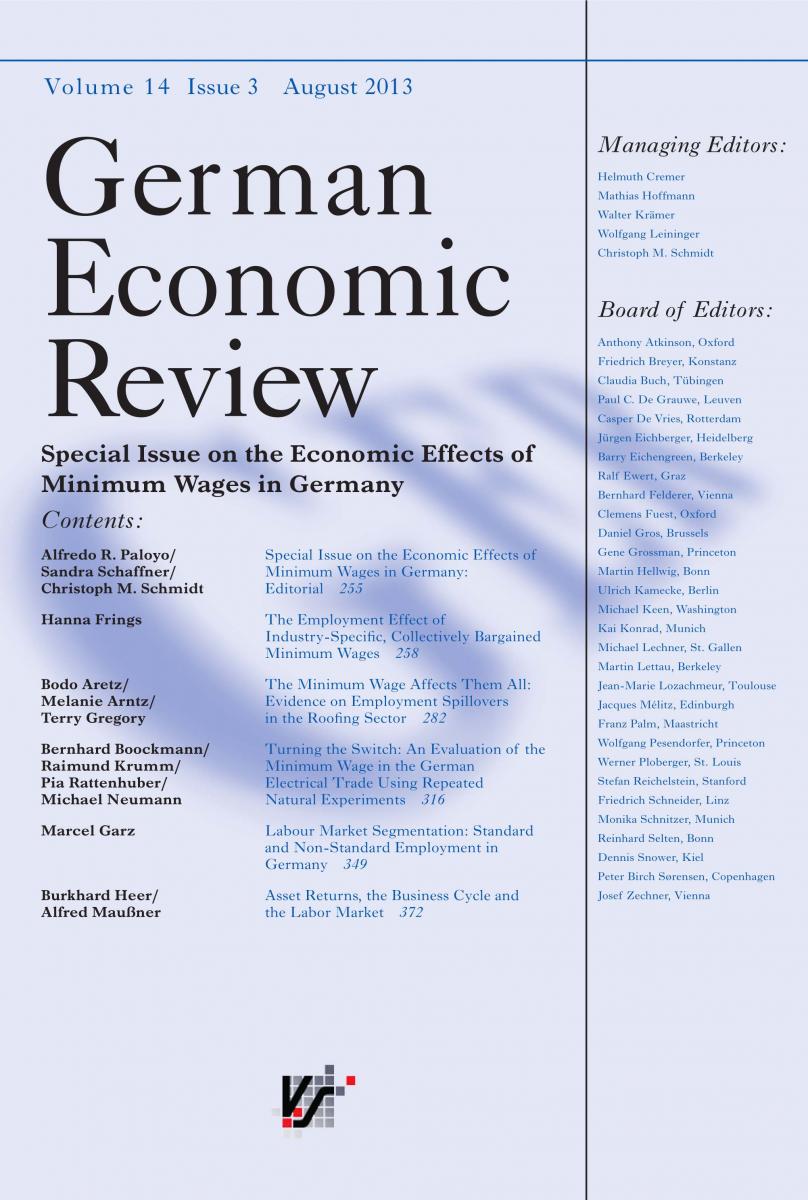
The Distorting Impact of Capital Controls
in: German Economic Review, Nr. 1, 2012
Abstract
This paper uses panel data to show that capital controls have a significant impact on international interest rate differentials. Various types of controls can be distinguished within the data. The analysis shows that the aforementioned effects of capital controls on interest rates are especially strong in the case of capital import controls on portfolio capital; the implementation of these controls has been suggested in the wake of the Asian Crisis to prevent further crises. The results presented herein contradict the hypothesis that capital controls can achieve a restructuring of the maturity of capital inflows without a distortion in international capital allocation.
Arbeitspapiere
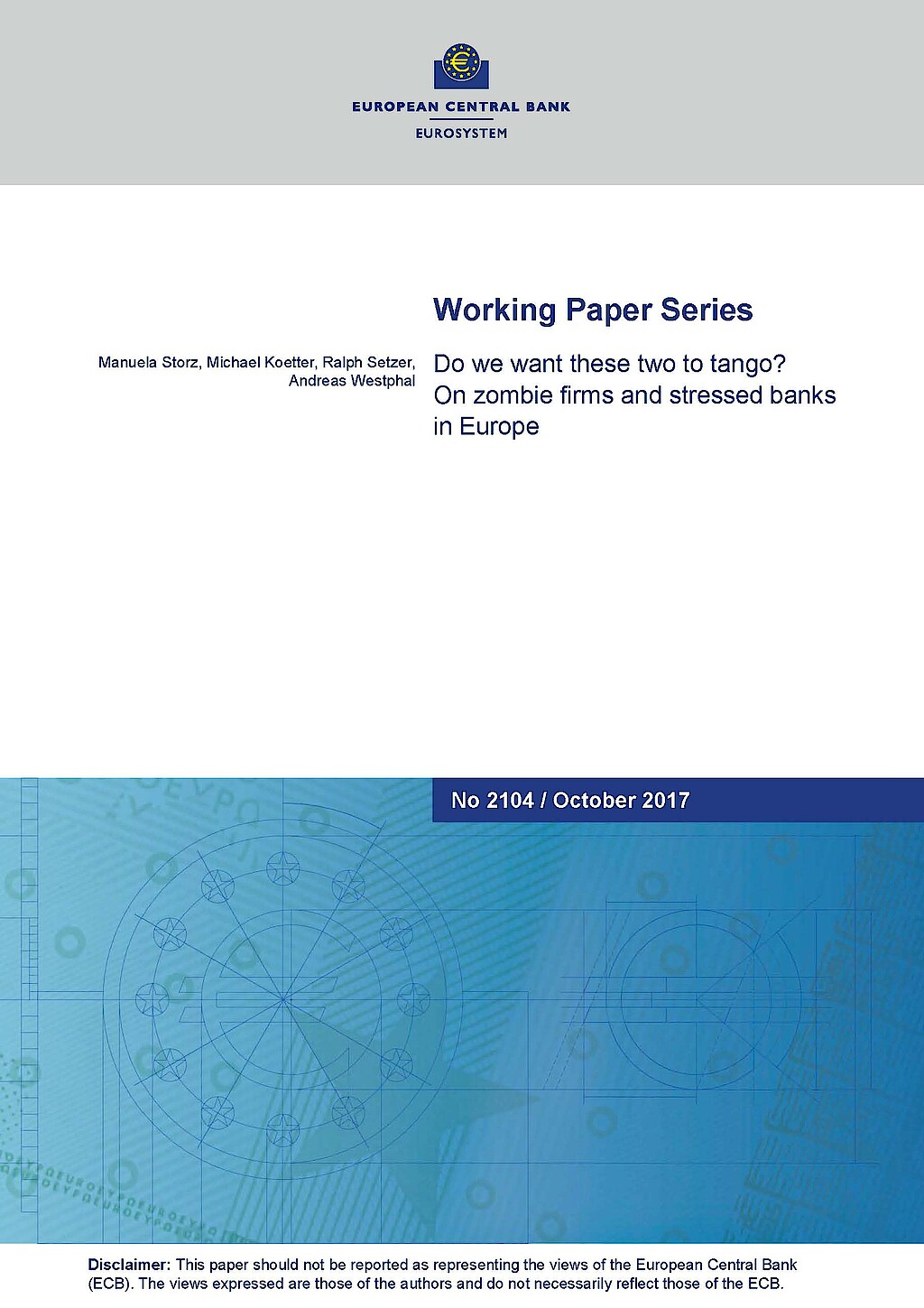
Do We Want These Two to Tango? On Zombie Firms and Stressed Banks in Europe
in: ECB Working Paper, 2017
Abstract
We show that the speed and type of corporate deleveraging depends on the interaction between corporate and financial sector health. Based on granular bank-firm data pertaining to small and medium-sized enterprises (SME) from five stressed and two non-stressed euro area economies, we show that “zombie” firms generally continued to lever up during the 2010–2014 period. Whereas relationships with stressed banks reduce SME leverage on average, we also show that zombie firms that are tied to weak banks in euro area periphery countries increase their indebtedness even further. Sustainable economic recovery therefore requires both: deleveraging of banks and firms.
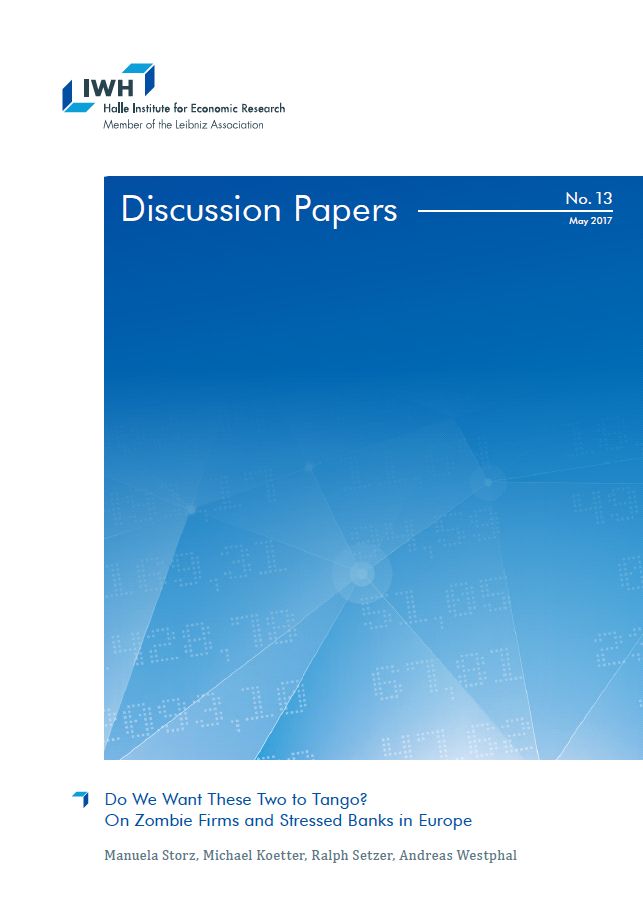
Do We Want These Two to Tango? On Zombie Firms and Stressed Banks in Europe
in: IWH Discussion Papers, Nr. 13, 2017
Abstract
We show that the speed and type of corporate deleveraging depends on the interaction between corporate and financial sector health. Based on granular bank-firm data pertaining to small and medium-sized enterprises (SME) from five stressed and two non-stressed euro area economies, we show that “zombie” firms generally continued to lever up during the 2010–2014 period. Whereas relationships with stressed banks reduce SME leverage on average, we also show that zombie firms that are tied to weak banks in euro area periphery countries increase their indebtedness even further. Sustainable economic recovery therefore requires both: deleveraging of banks and firms.

Inside Asset Purchase Programs: The Effects of Unconventional Policy on Banking Competition
in: ECB Working Paper Series, Nr. 2017, 2017
Abstract
We test if unconventional monetary policy instruments influence the competitive conduct of banks. Between q2:2010 and q1:2012, the ECB absorbed Euro 218 billion worth of government securities from five EMU countries under the Securities Markets Programme (SMP). Using detailed security holdings data at the bank level, we show that banks exposed to this unexpected (loose) policy shock mildly gained local loan and deposit market shares. Shifts in market shares are driven by banks that increased SMP security holdings during the lifetime of the program and that hold the largest relative SMP portfolio shares. Holding other securities from periphery countries that were not part of the SMP amplifies the positive market share responses. Monopolistic rents approximated by Lerner indices are lower for SMP banks, suggesting a role of the SMP to re-distribute market power differentially, but not necessarily banking profits.
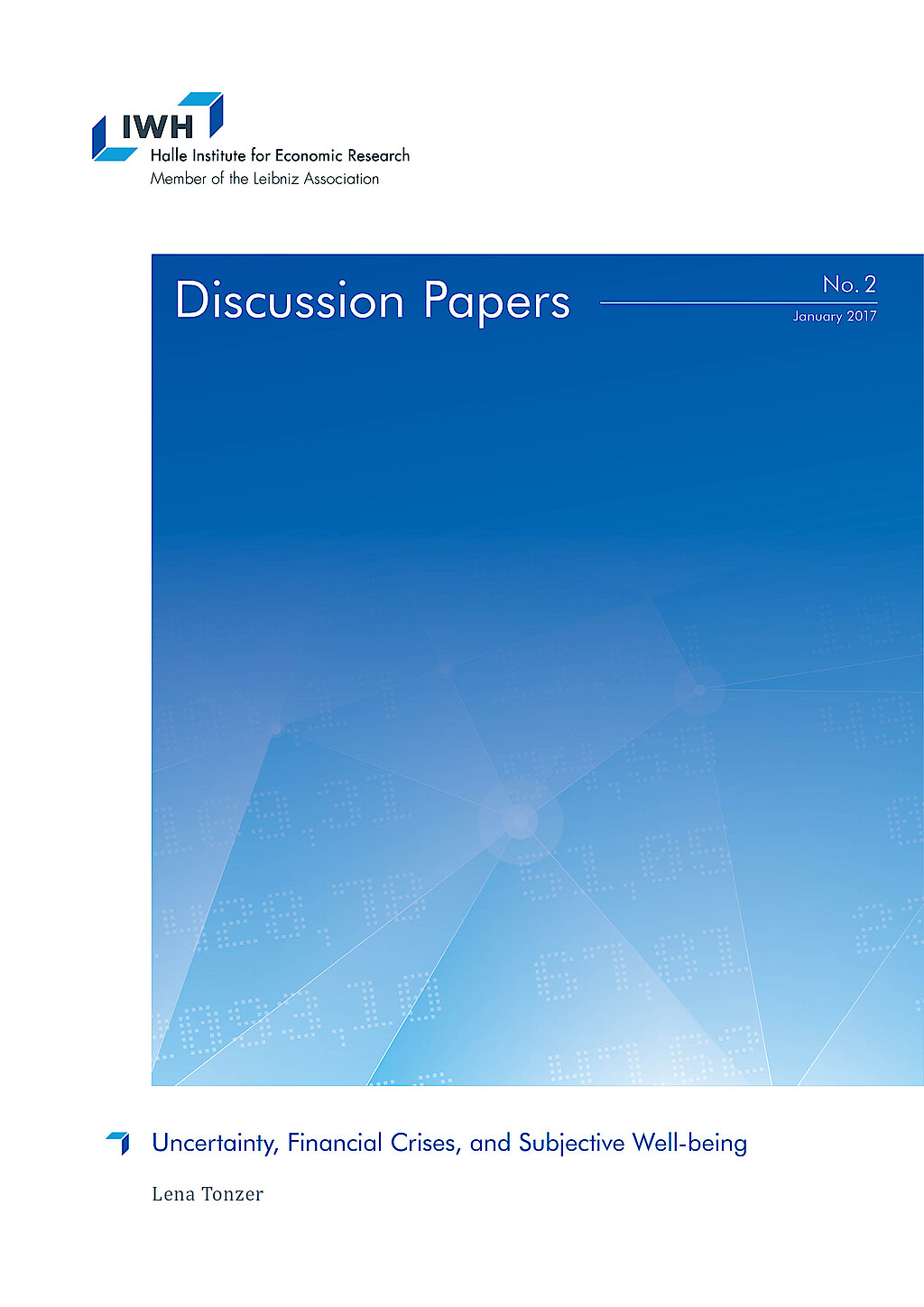
Uncertainty, Financial Crises, and Subjective Well-being
in: IWH Discussion Papers, Nr. 2, 2017
Abstract
This paper focuses on the effect of uncertainty as reflected by financial market variables on subjective well-being. The analysis is based on Eurobarometer surveys, covering 20 countries over the period from 2000 to 2013. Individuals report lower levels of life satisfaction in times of higher uncertainty approximated by stock market volatility. This effect is heterogeneous across respondents: The probability of being unsatisfied is higher for respondents who are older, less educated, and live in one of the GIIPS countries of the euro area. Furthermore, higher uncertainty in combination with a financial crisis increases the probability of reporting low values of life satisfaction.

To Separate or not to Separate Investment from Commercial Banking? An Empirical Analysis of Attention Distortion under Multiple Tasks
in: IWH Discussion Papers, Nr. 2, 2016
Abstract
In the wake of the 2008/2009 financial crisis, a number of policy reports (Vickers, Liikanen, Volcker) proposed to separate investment banking from commercial banking to increase financial stability. This paper empirically examines one theoretical justification for these proposals, namely attention distortion under multiple tasks as in Holmstrom and Milgrom (1991). Universal banks can be viewed as combining two different tasks (investment banking and commercial banking) in the same organization. We estimate pay-performance sensitivities for different segments within universal banks and for pure investment and commercial banks. We show that the pay-performance sensitivity is higher in investment banking than in commercial banking, no matter whether it is organized as part of a universal bank or in a separate institution. Next, the paper shows that relative pay-performance sensitivities of investment and commercial banking are negatively related to the quality of the loan portfolio in universal banks. Depending on the specification, we obtain a reduction in problem loans when investment banking is removed from commercial banks of up to 12 percent. We interpret the evidence to imply that the higher pay-performance sensitivity in investment banking directs the attention of managers away from commercial banking within universal banks, consistent with Holmstrom and Milgrom (1991). Separation of investment banking and commercial banking may indeed be associated with a reduction in risk in commercial banking.















